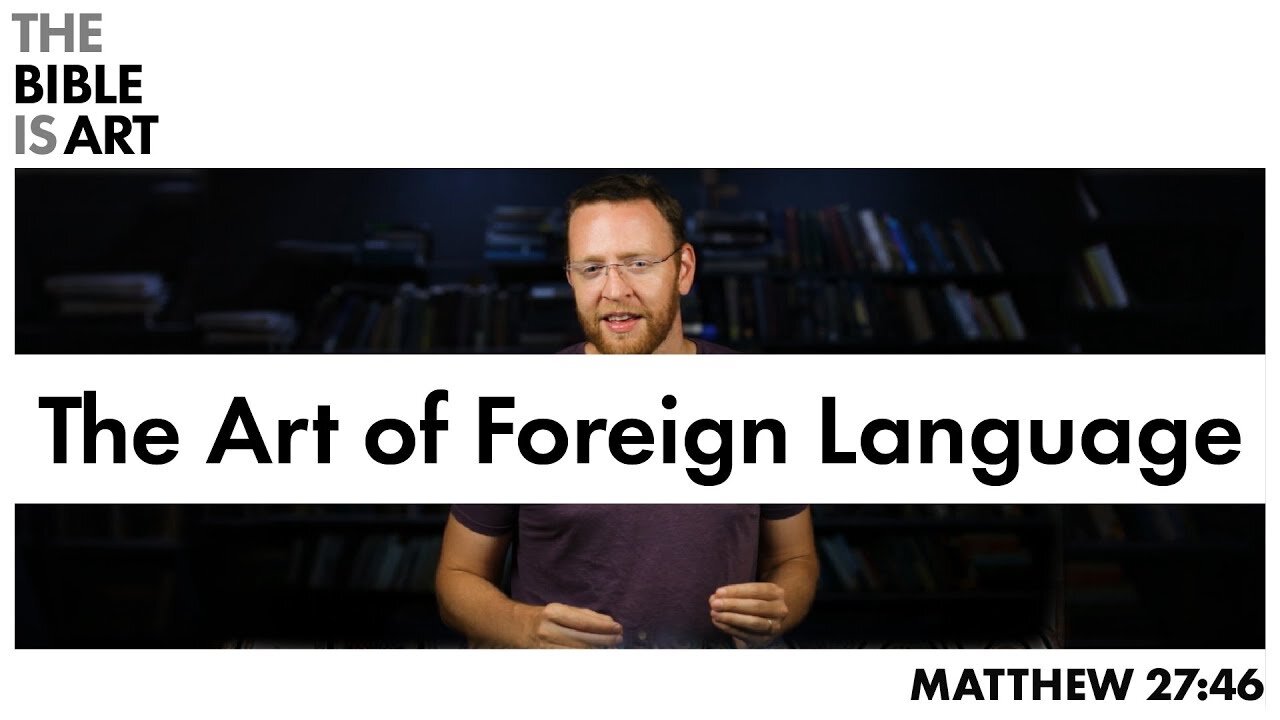Premium Only Content

The Art of Foreign Language | Matthew 27:46
In this video I look at the fascinating things that Matthew is doing when he quotes Jesus in another language than the rest of the gospel, "Eli, Eli, lema sabachthani", "My God, My God, why have you forsaken me?" (Matthew 27:46).
The Bible is the greatest work of literary genius. And The Bible is Art is a YouTube Channel devoted to explaining this literary art in all its sophistication, elegance, and design.
Patreon: https://www.patreon.com/thebibleisart
website: https://www.thebibleisart.com
email: thisdivineart@gmail.com
twitter: @johnbhiggins
music: Kai Engel, "Coelum" (https://www.kai-engel.com)
| How to Learn to Read the Bible as Literary Art |
Reading Biblical Narrative: An Introductory Guide (https://amzn.to/30LzaRa)
Narrative Art in the Bible (https://amzn.to/30RVGIb)
The Art of Biblical Narrative (https://amzn.to/3aDrIfk)
Old Testament Narrative: A Guide to Interpretation (https://amzn.to/38rcE2C)
The Poetics of Biblical Narrative (https://amzn.to/2Gh4cqE)
| Literary Structure |
Literary Structure of the Old Testament (https://amzn.to/30Jdm8X)
Style And Structure In Biblical Hebrew Narrative (https://amzn.to/2RDTTlQ)
| Genesis |
Creation: The Story of Beginnings - Grossman (https://amzn.to/2GlPwq9)
Abram to Abraham: A Literary Analysis of the Abraham Narrative - Grossman (https://amzn.to/2v7id7Z)
Narrative Art in Genesis - Fokkelman (https://amzn.to/2ulmd4t)
A Commentary on the Book of Genesis (Part I) - Cassuto (https://amzn.to/2NOAhdt)
A Commentary on the Book of Genesis (Part II) - Cassuto (https://amzn.to/2Gcuk6d)
Genesis: A Commentary - Waltke (https://amzn.to/2vaBvt7)
The Gospel of Genesis: Studies in Protology and Eschatology - Gage (https://amzn.to/2RGjRFo)
Abraham and All the Families of the Earth: A Commentary on the Book of Genesis 12-50 - Janzen (https://amzn.to/2TVyCqJ)
Genesis 1-15, Volume 1 - Wenham (https://amzn.to/2TQnYRO)
Genesis 16-50, Volume 2 - Wenham (https://amzn.to/3aDY21J)
| Transcription |
Welcome back to the Bible is art where we explore the literary artistry of the Bible and this week we’re looking at why Matthew has Jesus speak in a foreign language from the cross and then translates it. And I know that doesn’t sound interesting but I promise it is super fascinating.
When Jesus is on the cross Matthew tells us that he “cried out with a loud voice, saying, "ey-li, ey-li, lema, sabachth-ani? That is, "My God, my God, why have you forsaken me?" That is, Matthew is giving the original words that Jesus spoke. Now this is strange.
Matthew’s Gospel was written in Greek and Jesus’ normal everyday language was Aramaic. Nowhere else in his Gospel does Matthew give us the original Aramaic words of Jesus. All the rest of the words of Jesus were originally in Aramaic but Matthew chose to translate them into Greek for the Gospel. So why have them foreign only here?
You might think it’s because it’s important, and while that’s certainly true that can’t be the only reason because other places like sermon on the mount or resurrection don’t have a different language. So there has to be something about its differentness, it’s foreignness.
Matthew uses a foreign language to the text, a different language from the rest of the Gospel, because what is happening is so foreign. The form matches the content. God’s anointed king is killed, forsaken by his Father. This is the most unknown foreign event conceivable. It is fitting, therefore, that the language used to communicate it equally foreign and strange.
But Matthew goes one step further. He interprets it. After he quotes Jesus’ Aramaic, Matthew said, “That is, "My God, my God, why have you forsaken me?" Why does Matthew translate what he had made foreign? I mean, if he was going to translate it anyway, why go to the trouble to include the original, untranslated language in the first place?
Think about what we just saw about Matthew’s reason for making it foreign. He made the language foreign because the content, the thing it was describing, Jesus being forsaken by his Father, was so foreign.
So if Matthew translates it, that means that the foreignness won’t remain foreign. And if the language mirrors reality, perhaps the death, the Father abandoning, that is so foreign to Jesus’ life will also be interpreted, translated into something intelligible. Perhaps this capital punishment will become a sacrifice, an entombed carcass a seed.
-
 4:35
4:35
AfricanNewsAgency
3 years ago $0.01 earnedforeign language
751 -
 5:28
5:28
NEWSMAX
3 years agoMatthew Whitaker: Hunter Biden’s Art Deals Troublesome
1.75K17 -
 0:31
0:31
MillennialManMotionsEntertainmentLLC
3 years agoLanguage Joke
661 -
 20:11
20:11
Candace Show Podcast
12 hours agoBecoming Brigitte: Candace Owens x Xavier Poussard | Ep 6
193K331 -
 8:25:38
8:25:38
Dr Disrespect
16 hours ago🔴LIVE - DR DISRESPECT - ELDEN RING DLC - REVENGE
194K22 -
 54:22
54:22
LFA TV
1 day agoThe End of the Trans-Atlantic Alliance | TRUMPET DAILY 2.17.25 7PM
50.2K7 -
 55:56
55:56
BIG NEM
15 hours agoUGLY COCO: The Rapper Who’s Tried EVERY PSYCHEDELIC 🌌
22.6K1 -
 1:42:51
1:42:51
2 MIKES LIVE
13 hours ago2 MIKES LIVE #181 Deep Dive Monday!
26.8K3 -
 1:57:43
1:57:43
Quite Frankly
13 hours ago"Low Tide at The Pier: Munich Tears" 2/17/25
38.5K19 -
 27:44
27:44
The Based Mother
14 hours ago $0.80 earnedBOOK BAN LIES. Karen England and the MSM fairy tale that books are being “banned” by fascists
18.8K3